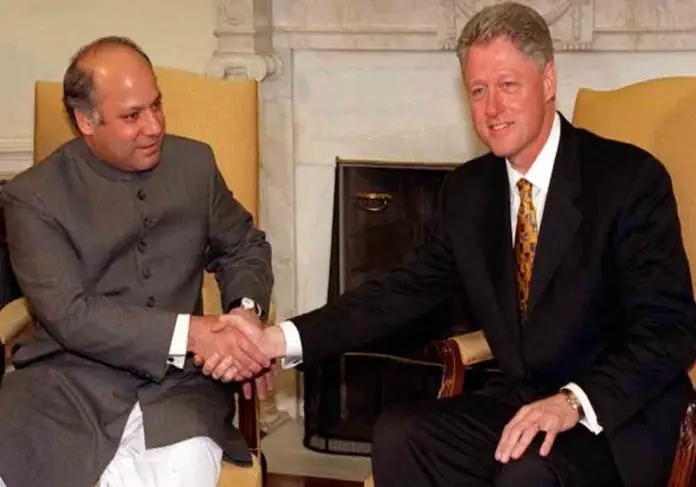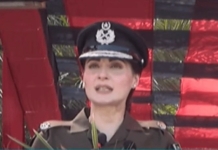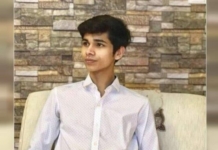Pakistan and India are always in the race to win the status of a ‘blue-eyed ally’ when it comes to the United States of America. More than seven decades of both countries’ existence has seen their dynamics and relations with the US changing from time to time.
Every nation wants to be friends with the superpower, but over the years, many countries have shown a potential to be the next superpower. Hence, preferences of other international actors change when it comes to questions about procuring military equipment, engaging in trade, and forming strategic partnerships.
Having a nuclear war in this era is near to impossible, but acquiring a nuclear bomb with the aim of protecting the sovereignty of a country is not. India, when it tested a nuclear bomb in 1998, was aware that the move would have consequences not for their own country, but for the whole region.
Strobe Talbott, the then deputy secretary of the US State Department, in his book Engaging India, that he later released in 2004, has said, “The Indians conducted their test knowing that it would provoke American castigation but also hoping it might have another consequence: perhaps it would force the United States to pay them serious, sustained, and respectful attention of a kind that Indians felt they had never received before.”
According to Talbott, the United States didn’t know about the Indian nuclear test, and they came to know of it only through CNN.
Minute Mirror got in touch with two diplomats who were serving at that time to get them to corroborate the aforementioned statement and other major claims made by Talbott in his book.
Shamshad Ahmad Khan, Pakistan’s then foreign secretary, while exclusively talking to Minute Mirror, spoke about US knowledge of Indian tests in 1998.
Khan said, “I don’t think that Talbott didn’t know about the Indian tests, as it was already reported in one of Canada’s Sikh newspaper [sic] that India is going for the nuclear test.”
The art of knowing the unknown
Talbott says that when India went for the nuclear tests, they knew that Pakistan will do something in response. However, from the American perspective, what was at stake was the stability of the global nuclear order.
Talbott argues that if India felt it had to have a bomb, other countries would conclude that they must have one too, and the world would become a much more dangerous place.Thus, for the next couple of years, Talbott had his due course of meetings with both Pakistan and India to curb their nuclear programmes.
He also claims that Pakistanis were telling Americans privately that they had stopped producing highly enriched uranium for their weapons programme. He adds that if what Pakistanis were saying was true, America might have been able to get them to announce that they were freezing the production of fissile material, the stuff of which the explosive part of a bomb is made of. Moreover, the Americans might also have been able to get Pakistanis open their enrichment facility at Kahuta to international inspection.
Another senior diplomat, [hereinafter referred to as ‘senior diplomat’], who has also been mentioned in Talbott’s book, while speaking to Minute Mirror said on the condition of anonymity, “When it comes to diplomatic relations, we have to be very specific about what information we are sharing and in what capacity. It’s not like that we bluffed the US. Everything was in front of everyone. It [diplomacy] depends on how we have to take our internal matters, and when it comes to the nuclear [programme], few people have all the details and it is supposed to be like this.”
Moreover, Khan said that all eyes were on Pakistan after India went for the nuclear test on May 11, 1998. Khan said that he, as part of a Pakistani delegation, was in Kazakhstan for a summit when he came to know about the Indian nuclear test. He said that he informed Nawaz Sharif, the then prime minister. In response, he said, the prime minister abruptly asked him, “Hun ki karna ae [What to do now]?”
Khan said, “We left the next day for Pakistan and received a message that Talbott wanted to come [to Pakistan] but I was in no position at that time to meet anyone.”
While responding to media queries at that time, Khan said, “We are in no hurry to reply to the Indian nuclear test.”
Talbott came to Pakistan on May 15, 1998, and met the civilian and military authorities with the view that Pakistan had a choice. According to Talbott, Pakistan could join the rest of the world in isolating India, or it could follow India down a “foolish, backward leading and dangerous path”.
“When India did the test, nobody said a word to them and when Pakistan went for it, it received all the condemnations in the world,” Khan said, adding that if Pakistan’s neighbouring country conducted the test, how was Pakistan supposed to do nothing about it.
According to Khan, Sharif and his ministers didn’t want to go for the nuclear test, but he had no other choice as the pressure from inside the country, specifically from the opposition, was building up.
“After the Indian test on May 11, we worked day and night for the next 17 days. We had to go through all the details bit by bit to see where we were standing as we knew that after the step we take, there will be a huge pressure from external forces,” Khan said.
Who made Pakistan a nuclear power?
On May 28, Nawaz Sharif, in the presence of General Karamat and Shamshad Ahmad Khan at Prime Minister’s House, gave a go-ahead to the nuclear tests.
Pressure at that time was high. Khan said, “Sharif was sweating badly. He asked General Karamat if we are ready for this. In response, General Karamat said we are ready but the final decision has to be taken by you as you have to face the consequences of the decision.”
Khan added, “Sharif looked at me and asked for my say on the matter. I responded that there is no price for survival.”
“It was a do or die situation for us as the Indian ministers were speaking about repeating Dhaka in Kashmir, and this time they also had a bomb with them. In history, the credit will always go to Nawaz Sharif for taking that decision.” said Khan.
Talbott claims that in a phone call on May 27, a timorous sounding Nawaz Sharif apologized to Clinton for ‘disappointing’ him. Sharif told Clinton that he simply had no choice but to go ahead with the test.
Regarding Sharif’s apology to Clinton, Khan said, “No one apologized. Talbott is a journalist. He might have exaggerated things.”
Khan added, “By responding to India, we served the cause of peace in the world and the region.”
On the other hand, Michael Kugelman, senior associate for South Asia at The Wilson Center, while speaking to Minute Mirror said, “Words attributed to Nawaz Sharif should be taken seriously as Talbott is someone with great credibility. But I think just because of the nature of Pakistani politics and the role that anti-American sentiment plays in it, I would argue that there is a lot of defiance in terms of the public messaging directed towards the United States regarding US policy.”
Kugelman added, “How India fits into that question and specifically on the history of the nuclear issue, my sense is that Pakistan has typically been very defiant in its public rhetoric about its nuclear weapons programme. Such a statement [Sharif apology] would be somewhat a private conversation rather than a public message.”
Diplomacy: Not so straightforward
In his interview with Asia Society, Talbott, while commenting on Nawaz Sharif’s arrival in the US amidst the Kargil crisis, said, “First of all, Nawaz Sharif should not even have received a visa or been let in at Dulles airport because he had not been invited. But we were not going to keep him from coming once he had expressed an interest in doing so. The whole situation was highly unusual and also quite volatile given what was happening in South Asia at the time.”
When Nawaz Sharif arrived in US at the time, Saudi Ambassador Prince Bandar bin Sultan received Nawaz Sharif and took him to the Blair House, the US president’s guest house.
Shamshad Ahmad Khan recalls the visit as unusual, as he himself was not informed beforehand about it.
“I was sitting in my office when I got to know that we have to go to US and I was shocked about who had arranged the visit. Later on, we got to know that Saudis had facilitated the visit on Musharraf’s request and Americans were also talking to the Indians regarding Kargil,” said Khan.
About the Saudi ambassador receiving Nawaz Sharif, Talbott says that having Bandar receive Sharif was just a way to soften him up. “Bandar was just to let him know that, as far as the Clinton administration is concerned, there is only one outcome that is acceptable in Kargil and that is what Bandar did.”
Kashmir: A nuclear flashpoint
When it comes to issues between India and Pakistan, Kashmir has always been at the top of the list. When Nawaz Sharif became prime minister, Khan says that he was told to start the dialogue with India, but was instructed that there would be no compromise on Kashmir.
“I have served in Track II and Track III diplomacy and I can say this confidently that leaders can only solve such issues with the help of diplomats. If leaders from both countries give authoritative rights to the diplomats, we can give a solution that is acceptable to all. As a diplomat, we are trained to get out of deadlocks. But for that, leaders have to give the authority to the diplomats,” said Khan.
US interest in mediation on Kashmir Issue
Regarding US role in solving issues between India and Pakistan, the senior diplomat said, “If we rely on the United States, then nothing is going to happen as it is not an objective mediator. If we rely on them for a settlement, it will be more in accordance with India.”
Moreover, Kugelman is of the view that the US has always said that if both the parties wanted, it could mediate. However, Kugelman added that India does not take Kashmir as a disputed issue and after the revocation of Article 370, it has made it clear that Kashmir was their internal matter.
Pakistan-US-India triangle over the years
Sartaj Aziz once remarked to Talbott, “Pakistan is the dependent variable in American reckoning about this region and India is the independent variable.”
Khan while commenting on Aziz’s remarks said, “This is the reality that he pointed out. Pakistan has relied on America’s help and India hasn’t.”
The senior diplomat, while commenting on the complex relationship between United States, Pakistan and India said, “United States was right from the beginning trying to woo India as it was a bigger country.”
He added that India also had in desperation turned to the US at some points.
“In 1962 when the Chinese attacked, the first country that Nehru approached was the US. John Kennedy supported India and even put pressure on Pakistan to not take advantage of the situation. Democrats always had a soft corner for India,” said the diplomat.
The diplomat was of the opinion that in the present and the coming days, US-India relationship would get stronger.
Kugelman also has similar views on this matter. “There is strong bipartisan support from Washington towards this idea that India is a much more important strategic partner than Pakistan, even though Pakistan is an ally of US, and India is not,” Kugelman said.
He added that despite Pakistan being an ally, US and India’s shared interests, specifically in the economic sector, have made India the preferred strategic partner as opposed to Pakistan.
Will PM Khan get a call from Biden?
Despite there being concerns about US President Biden not calling Prime Minister Imran Khan and questions whether a direct conversation between both the leaders will happen, experts are of the view that it does not hold much importance.
Even after so much uproar about US and Pakistan’s relations not going well in the local media, according to official records, Pakistan has received more COVID-19 vaccine doses from the US than any other country in the world. The United States has also provided $69.4 million in COVID-19 assistance through its partnership with the government of Pakistan.
“Biden’s approach towards Pakistan reflects the US policy more clearly. There will be a call when it is worth to call,” said Kugelman.
Shamshad Ahmad Khan’s views are similar to Kugelman’s; not getting a phone call is not an issue.
“Americans are still studying Khan and I don’t think that not getting a call is an issue. More important is how can relations be taken further. With all that has happened in the past, be it the nuclear tests, Kargil crisis, or issues related to Kashmir, we have to see how Khan leads Pakistan from the front,” said Shamshad Ahmad Khan.








Comments are closed.